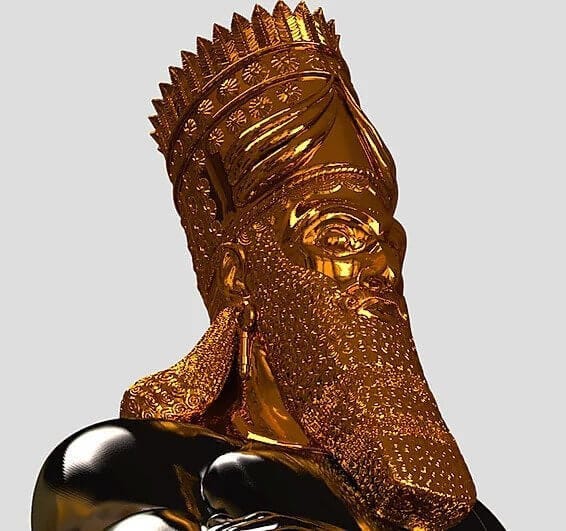Daniel 2:31 — Semitic Language Study
אַנְתְּה מַלְכָּא חָזֵה הֲוַיְתָ וַאֲלוּ צְלֵם חַד שַׂגִּיא צַלְמָא דִּכֵּן רַב וְזִיוֵהּ יַתִּיר קָאֵם לְקָבְלָךְ וְרֵוֵהּ דְּחִיל
You, O King, were looking and behold an image! A mighty image. It was large and of extraordinary splendor. It stood before you, and its appearance was frightening.
Here, Daniel begins by relaying the contents of Nebuchadnezzar’s dream. He does not yet reveal its interpretation. That comes later. What matters now is that the revelation is made known. As has been underscored in previous entries, Daniel is not able to reveal this mystery from his own wisdom or power. The main thesis of Daniel, as well as the rest of the canon more broadly, is that superlative power (whether it be from kings or sages) comes from God. It is no wonder, then, that this opening statement of the Bible’s thesis is an impressive attack on kingship and idolatry in one fell swoop. It is a divine indictment against apotheosis. The empire of Nebuchadnezzar may appear to be golden, but it is supported by much less valuable metal until you get to the bottom, which is just fractured clay. Eventually, the whole enterprise will fall.
The indictment against idolatry comes full force with our first lexical items. There is an interesting use of the word אֲלוּ ’elu — behold! which is from the demonstrative pronoun אֵל ’el, commonly translated as “these”. It also shows up in its elongated form אֵלֶּה ’eleh with a similar function. Gesenius connects this function with the Arabic definite article ال al, which is in turn related to the archaic form of the Hebrew definite article הַל hal.
This construction is evocative in Semitic languages because of its accidental similarity with אֵל ’el, the basic word for a deity. Hebrew, being free from abstraction, does not have a word for a likewise abstract “god”. This is rather a word connoting “strength”. Again, Gesenius maps out this function completely.
The term “god” is therefore just as functional as any other lexical item in the Bible. God is not an abstract essence, but the “mighty hero” par excellence. In fact, the pluralization highlights the superlativity of the biblical God by giving him the collective power of all of the ’elohim (gods) who had temples all around the cities. The immediate parallel is the fact that “Athens”, which is the plural Ἀθῆναι athēnai in Greek, refers to the multiple temples of the goddess Athena in the city. Her widespread presence testifies to the fact that Athens is her city. Likewise, the appelation ’elohim underscores the same point as the Shahada in Arabic. La ilaha il-Allah! There is no God, but God! In other words, there is no Mighty One mighter than He! In fact he’s so mighty that his presence dwarfs the complete relevance and functionality of the other gods. This is germane to the dream of Nebuchadnezzar, because he essentially views himself as a god, especially when viewed in conjunction with chapter 3.
Another word in this section that is relevant to the question of idolatry is צְלֵם ṣelem, which is a crucial function in scripture. It refers to a shadow or a shady area. The place name צַלְמוֹן ṣalmōn testifies to that as a “shady place”. Notably for this discussion, this is the word that is used when the scriptural God creates man in his ṣelem. This is fascinating because of its correspondence to the idolatrous images of the things men build. In other words, God is able to create a ṣelem but men are not afforded such a task. It is God who is projected, not the man. That is the issue with idolatry. It is a mechanism where men worship the work of their own hands, and then effectively worship themselves. Idols are able to be controlled. The scriptural God is wind. Go outside and try to control the wind. You can’t do it. If there’s a tornado outside, all you can do is seek shelter. Where it goes isn’t even totally predictable. If you’re at all in proximity, there’s danger. But men, who are in the ṣelem of God can be controlled. Principally, they can be (and are) controlled by God. There is no real autonomy. Idolatry is man’s foolish attempt to bring the divine down to his level so he can fool himself into believing he has ascended to God’s level. This is the hubris of monarchy in scripture. Man being made “in the ṣelem of God” is an unambiguous way of making it crystal clear that man IS NOT God. At best he is but a shadow. In fact, the Hebrew word for shadow sounds very similar. It is צֵ֖ל ṣel from the root צָלַל ṣalal — to grow dark. From the book of Job we have the impressive line:
כִּֽי־תְמֹ֣ול אֲ֭נַחְנוּ וְלֹ֣א נֵדָ֑ע כִּ֤י צֵ֖ל יָמֵ֣ינוּ עֲלֵי־אָֽרֶץ
For we are yesterday (ie in the past) and know nothing, for our days upon the earth are a shadow (צֵ֖ל). — Jb. 8:9
This is the thesis of the scriptural project.






